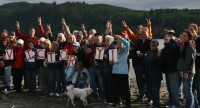Columbia Riverkeeper works with people in dozens of communities—from rural to urban—who share the same goals: Protect the health of their families and the places they love.
Case Study: Protecting the Estuary from LNG
Fracked gas companies targeted the lower Columbia River for liquefied natural gas (LNG) terminals. After defeating the Bradwood Landing LNG terminal in 2010, the people of the Columbia River estuary beat the last remaining LNG terminal proposal—called Oregon LNG—in April 2016. For both Bradwood and Oregon LNG, the gas giants were supposed to win. They carefully selected small towns, greased the skids, and hired all the right law firms and lobbyists. Nobody warned them about people’s fierce love of the river and how hard they would fight to protect it. Twelve years of smart, creative, and persistent effort by local residents and partners defeated LNG and protected the mighty Columbia. Stories of local opposition to LNG are legion—from Warrenton, Astoria, Puget Island, Vernonia, and Forest Grove to name a few. The public hearings were endless. And the courts always had an LNG case or two. In the end, LNG’s fate was decided when the rallying cry of a coastal fishing town reached a New York City board room; we value our river more than a $6-billion fossil fuel export project. But this victory reverberated across our nation. We received dozens of calls from reporters, climate leaders, and elected officials throughout the United States. At the time, Oregon LNG was the last best hope for exporting fracked gas from the West Coast. The victory prevented the export of 1.2 billion cubic feet per day of fracked natural gas; a stunning volume of carbon, which would drive more fracking across the West. That’s twice as much gas as Oregon uses each day. We are moving aggressively toward renewable energy. New infrastructure to support fracking and burning natural gas takes us in the wrong direction. The victory also protected critical salmon habitat. Oregon LNG planned to dredge a 135-acre hole in the Columbia River for LNG tankers—the largest private dredging project in the history of the Columbia River. The victory prevented a giant industrial scar in the Columbia River estuary, one of the most beautiful places on earth. Oregon LNG is a lesson and the inspiration we point to when challenges are daunting. This victory empowers. This victory gives hope.




